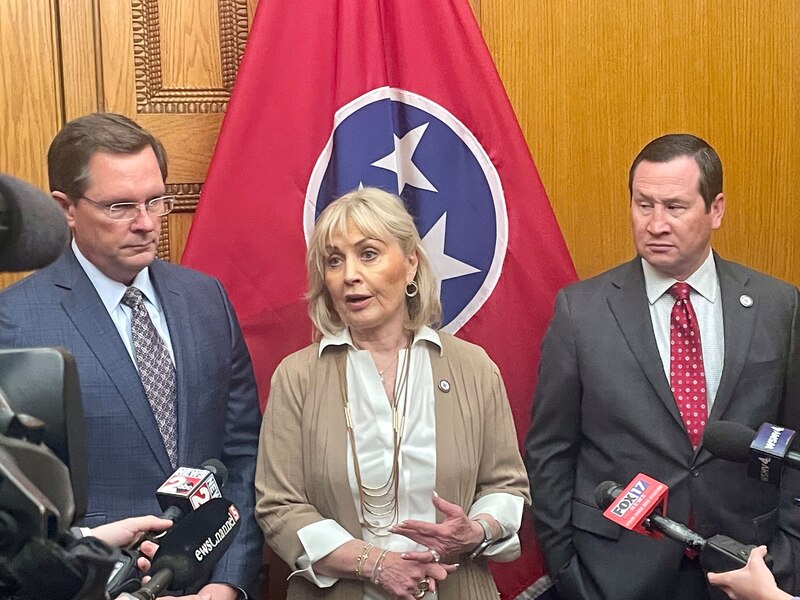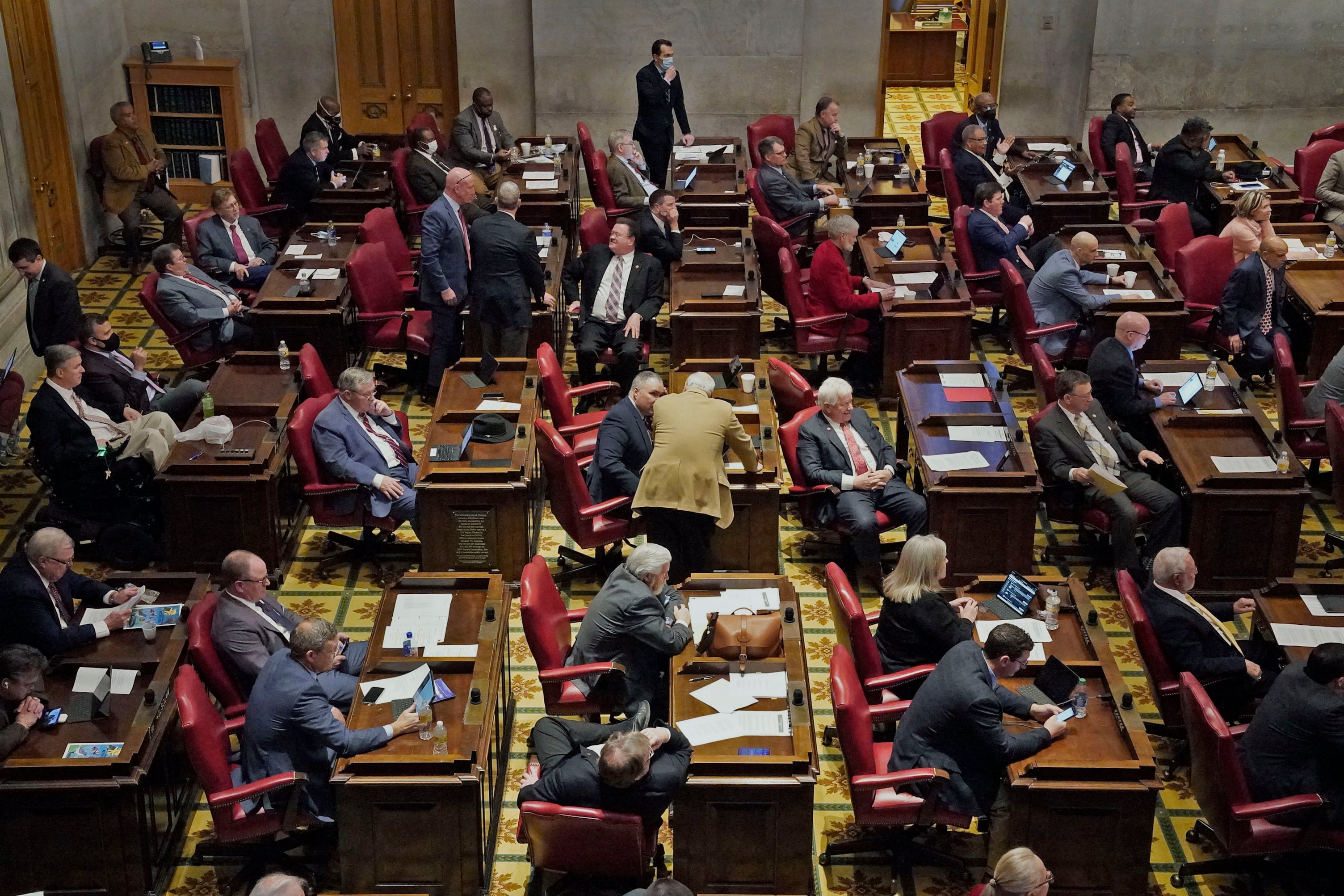Sign up for Chalkbeat Tennessee’s free daily newsletter to keep up with statewide education policy and Memphis-Shelby County Schools.
Tennessee lawmakers approved a state budget Thursday that includes $144 million to create a statewide school voucher program that Republican leaders say they’re still working to pass.
The money is in place in case the GOP-controlled House and Senate find a way to reconcile vastly different proposals for the voucher program, which would provide taxpayer funding toward private school tuition for up to 20,000 students. The universal voucher bill, called the Education Freedom Scholarship Act, is Republican Gov. Bill Lee’s top education priority.
But as lawmakers aim to wrap up their 2024 session by next week, the passage of the budget limits options for negotiators seeking to convince House members to compromise on their more expansive — and expensive — voucher bill.
To convince mostly rural representatives who are hesitant about taking funding away from their local school districts for private school vouchers, the House measure also seeks to give public schools $75 per student for building construction and maintenance, as well as money to increase the state’s contribution toward teachers’ medical insurance coverage from 45% to 60%, among other enticements for public school supporters.
Voucher bills stuck in finance committees
Meanwhile, the dueling voucher bills languished in finance committees for a fourth straight week without action, making the proposal’s chances for passage increasingly dim.
Still, Lt. Gov. Randy McNally said it was “premature” to declare the bill dead, as several news reports have done.
Until the legislature adjourns, “it’s still alive,” he told reporters.
McNally said the Senate is poised to approve its voucher bill, which unlike the House’s version requires recipients to take some type of annual test to show their academic progress. The measure, which is sponsored by Majority Leader Jack Johnson and has 17 Senate co-sponsors, also calls for open enrollment across public school systems.
House Speaker Cameron Sexton, whose chamber is more divided over the voucher plan, was reserved in his enthusiasm but pledged to keep working on a deal.
“At the end of the day, it’s an administration bill,” Sexton told reporters. “Until (Gov. Lee) tells us to stop negotiating and working with the Senate, then we’re going to continue to do that.”
Democratic lawmakers have been united in their opposition to either bill — and are staying vigilant as the legislative session enters its final week.
“I’ve seen legislation pass at 2 in the morning that we thought was dead for the year,” said Senate Minority Leader Raumesh Akbari of Memphis, who has served in the General Assembly since 2013.
“Anything can happen; anything has happened,” she added.
Base teacher pay will rise
State revenues are down, one-time federal COVID relief funding is running out, and money is tighter this year after years of budget surpluses.
Against that backdrop, the House and Senate voted along mostly partisan lines to approve a nearly $53 billion state government budget for the fiscal year that begins July 1.
The spending plan injects an extra $261 million in the state’s K-12 education system, almost half of which will go toward raising the annual minimum salary for public school teachers from $42,000 to $44,500.
“It keeps us on track to bring our base salary for our teachers to $50,000 a year by fiscal year ‘26-’27,” said House Finance Committee Chairperson Patsy Hazlewood, a Republican from Signal Mountain.
Nashville Democrats tried to add numerous budget amendments in both the House and Senate.
Rep. Aftyn Behn and Sen. Heidi Campbell sought to double the number of seats in the state’s pre-kindergarten program by reallocating the $144 million in voucher money. Rep. Bo Mitchell proposed scuttling $15 million in non-recurring funds set aside to help public charter school operators pay for school facilities and maintenance. And Rep. John Ray Clemmons proposed doing away with the Tennessee Public Charter School Commission and investing its funding instead in the state’s K-12 education funding formula.
The amendments were easily defeated.
Democrats also criticized a measure that includes up to $1.95 billion in tax breaks and refunds for businesses, but little tax relief for working families or new investments for impoverished Tennesseans.
“Because of the refusal of this body and our government to address poverty to help the poor and the marginalized, we are continuing to deal with a deficit, not only financially but morally in this institution,” said Rep. Justin Pearson, a Memphis Democrat who voted against the budget.
Hazlewood, the House finance chairperson, countered that the state’s poverty rate has gone down over the past decade. She characterized Tennessee as a “middle-class family” that has to spend its dollars carefully and is prioritizing programs that benefit education, families, safety, health, and social services.

Peppered with questions about what would happen to the $144 million for vouchers if the new program isn’t approved, she said the money can’t be reallocated without the legislature’s approval.
“If there’s no bills (approved) that address that, any monies unspent remain in the budget. We may need those other monies when we come back in next year,” Hazlewood said, adding that the voucher funds also can’t be spent by the governor through an executive order.
Tennessee already has several smaller voucher initiatives. A program for students with disabilities launched in 2017, and the state education department rolled out a targeted pilot program for low-income students in Davidson and Shelby counties in the fall of 2022. It has since added Hamilton County and has 2,095 students enrolled in all three counties.
Marta Aldrich is a senior correspondent and covers the statehouse for Chalkbeat Tennessee. Contact her at maldrich@chalkbeat.org.






